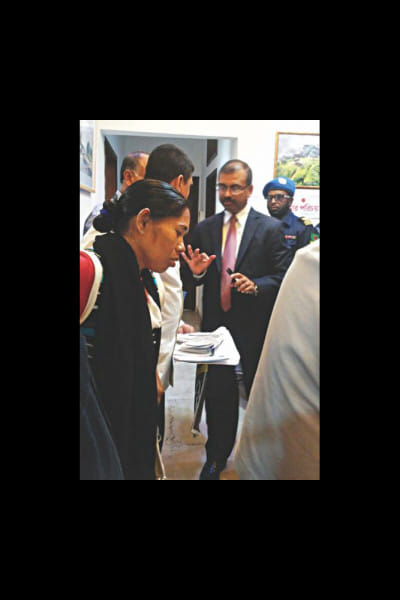When our migrant workers are left to die

After her employers in Lebanon cancelled her contract, Bangladeshi worker Maksuda Begum was left in a dire state. She had worked for a Lebanese family as a domestic worker for two years, but after they cancelled her contract for no apparent reason, she was forced to remain there as an undocumented worker. Stranded in a foreign country, Maksuda, who had been suffering from serious ailments for the last five months, moved from pillar to post to get the treatment that she needed but to no avail. The 35-year-old lost her life at a hospital in Beirut on January 16.
Maksuda, a garments worker in Bangladesh, had left the country in 2012 in search of a more stable economic life. But after the sudden cancellation of her contract two years later, she had to struggle to make ends meet, as she was forced into the status of an undocumented worker and found it difficult to find work. Things took a drastic turn for the worse when it was found that she had two tumours in her stomach and had also been suffering from kidney complications for several months. Her fellow Bangladeshi migrants in Lebanon alleged that despite repeated efforts to get funding for treatment and other assistance, the Bangladeshi embassy in Lebanon did not handle the matter sincerely or diligently.
When even after three months the embassy failed to treat Maksuda's concerns with the urgency that they required, some fellow migrants extended their support and arranged for her departure to Bangladesh. When members of the organisation requested embassy officials to process her repatriation as soon as possible, they alleged that the officials misbehaved with them.
Despite their sincere efforts, the workers were unable to save Maksuda, as the airport authorities denied her permission to fly because of her physical condition. She was taken to a local hospital in Beirut afterwards where she breathed her last four days later.
Bangladeshi Ambassador to Lebanon, Abdul Motaleb Sarkar, argues that the allegations of the migrants are false, adding that they tried their best to help Maksuda but as the process of clearance is complex in Lebanon for undocumented foreign workers, it took them time to issue her clearance.
The Bangladeshi ambassador is hopefully right about his assertions that the embassy was there for Maksuda when she needed them the most, despite the claims of several of her compatriots who argued otherwise. However, that doesn't dilute the fact that Bangladeshi migrant workers — the same who send home remittance of around USD 14 billion a year — have time and again complained of demeaning, condescending and non-cooperative attitudes from the embassies and labour wings of the country's foreign missions.
In most cases, officials and staff of the labour wings are unresponsive to their needs, allege migrant workers, despite the fact that the government is spending crores of taka from migrant funds to meet the expenses of these officials and staff ("Migrants get little help", December 19, 2015, The Daily Star). They also assert that due to lack of coordination and cooperation from these officials, they have been forced to lose their jobs and even face deportation from the countries they worked in. At a day-long programme organised by the Expatriates' Welfare and Overseas Employment Ministry in 2015, migrant workers also alleged that instead of helping them in times of crises, labour wing officials sometimes delay in providing services such as issuing passports or travel permits.
Over the years, there have been numerous complaints and allegations of Bangladeshi migrant workers facing abuse and exploitation in the hands of their employers, especially those in the Middle East, where they are often treated like poorly paid slaves. In December 2016, the Human Rights Watch (HRW) also called upon the Bangladesh government to improve protection for its domestic workers migrating to the Middle East. The reputed international organisation claimed that even though Bangladesh has become "an outlier in Asia for actively seeking employment of domestic workers in the Middle East", the country has failed to protect their rights adequately, whereas other domestic workers' countries of origin such as Indonesia, Sri Lanka and Nepal have "vocally denounced abuse abroad and increased protections and salary requirements for their migrant workers."
The fact that Maksuda was forced to stay back in Lebanon as an undocumented worker for two years after her termination, even though she went there with all the required papers, testifies to our reluctance to question the intention and legal system of destination countries that accept the labour of our workers but don't hesitate to dump them unceremoniously when their work is no longer required. The situation is especially perilous in Middle Eastern countries like the UAE and Oman, where employers basically confiscate the passports of migrant workers to keep them from leaving. This is further aggravated by the restrictive kafala system practiced in most Middle Eastern countries, which ties the visas of migrant domestic workers to their employers, thereby effectively preventing them from working for a new employer without the permission of current employer, even if they are abusive.
In a report on abuses against migrant domestic workers in Oman, published by Human Rights Watch in July 2016, almost all the Bangladeshi women workers interviewed said that their passports were confiscated by their employers, and that they were not paid their full salaries but were forced to work excessively long hours without days off, and denied adequate food and living conditions. A female migrant worker narrated a harrowing tale of abuse and exploitation in the hands of almost every party involved in her migration, starting from the recruitment agent to her employer. She detailed how she paid an agent in Bangladesh USD 750 for a job in the UAE but the recruitment agent there "sold" her to a man, who forced her to work 21 hours a day for a family of 15 with no rest or day off, verbally abused and sexually harassed her, and withheld her entire salary. Her passport was obviously confiscated and when she pleaded with her employer to let her leave, he sent her back to the agency in Oman who "beat her that night 50 times with a stick."
Apart from Kuwait, no other Middle Eastern country sets minimum salaries for migrant workers. However, embassies of other countries of origin require employers to agree to monthly minimum salaries; Philippines stresses on the highest minimum salary of USD 400 while Indian embassies in the Gulf require employers to provide USD 3,000 "as a refundable security deposit, which is used to pay for return flight tickets or unpaid salaries when an employer is abusive. Bangladesh, on the other hand, has the lowest minimum wage of USD 200, which is almost never claimed.
The situation is especially risky for female domestic workers who are vulnerable to sexual and physical abuse alongside backbreaking work. Interestingly, most country-of-origin embassies in the Middle East provide shelter to domestic workers when they seek to escape abusive and exploitative employers, and even offer assistance in filing claims against their employers. There are very few Bangladeshi embassies, on the other hand, which offer shelter, thereby leaving women workers without any refuge to turn to when they are abused.
In our pursuit for more remittance, we are putting our workers at risk by setting weak protections and asking for cheaper salaries when compared to several other countries. If we want to ensure that our workers get the respect they truly deserve, we need to offer them the highest protections, which as suggested by the HRW, include increasing monitoring over our recruitment agents, and aiding workers in distress. In order for us to do that, the staff of the labour wings of our foreign missions need to be sensitised and trained on how to approach and behave with migrant workers. Embassies in vulnerable regions with a history of abuse, for example, the Middle East, should set procedures that enable workers to register allegations of abuse, overwork, and denial of pay and proper living standards. These allegations should be further investigated upon the return of the workers. Bangladesh should also ratify the International Labour Organisation Domestic Workers Convention, a treaty that requires countries of origin to "cooperate with other countries to ensure protection migrant domestic workers," which has been ratified by 23 other countries. If we want others to stop taking our migrant workers for granted, we should first stop taking them for granted. It's only when we stop exploiting them that others will follow the lead.
The writer is a member of the Editorial Team, The Daily Star.

 For all latest news, follow The Daily Star's Google News channel.
For all latest news, follow The Daily Star's Google News channel. 



Comments